Iran's Security Chief Holding 'Crucial' Talks Abroad - Report
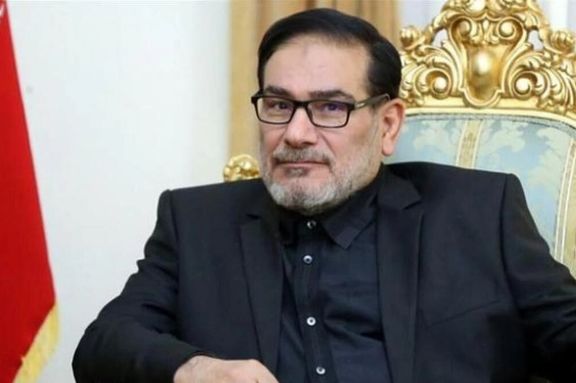
Iran's national security chief Ali Shamkhani, has been conducting “very important negotiations” in a foreign country in the past days, a website close to him reports.

Iran's national security chief Ali Shamkhani, has been conducting “very important negotiations” in a foreign country in the past days, a website close to him reports.
Nour News said Friday that the results of these talks will be announced soon and will signal “noteworthy developments.”
There have been signs that the United States might be negotiating with Iran to secure the release of two Iranian-Americans held hostage in Tehran. Officials from Qatar and Oman have recently held frequent discussions with the Islamic Republic. The two Arab countries have maintained good relations with Tehran and have played the role of mediators in the past.
Iran International reported in January that US special envoy Robert Malley held several discreet meetings with Iran’s ambassador to the United Nations in New York.
At the time, the State Department did not deny the report and in response to questions by Iran International said that messages were being delivered to the Islamic Republic, even though the nuclear deal, JCPOA, “is not on the agenda.” That could mean warnings were being delivered to Tehran not to expand military ties with Russia or talks over dual-nationals held in Iran.
In the past, there have been multiple reports about a possible deal by which the US agrees to the release of $7 in frozen Iranian assets held in South Korea in exchange for the release of prisoners.
However, after Iran’s bloody crackdown on protesters, killing more than 500 civilians, and its supply of killer drones to Russia, a deal providing billions of dollars to the clerical regime could be politically costly for the Biden administration.
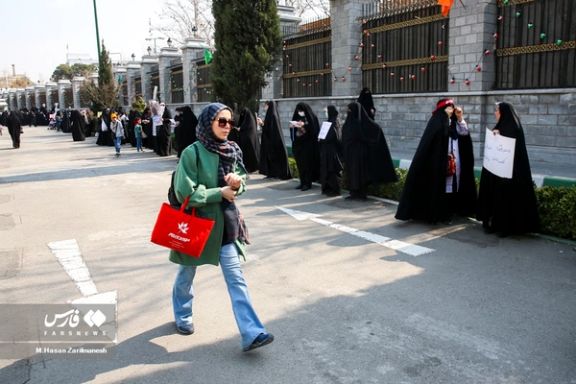
Iran's hardliners appear to be launching a new effort to enforce veiling laws more forcefully again to put a stop to women’s increasing defiance of the compulsory hijab.
At a meeting of the State Social Council Thursday, President Ebrahim Raisi described women’s abidance by veiling laws as a “sharia requirement” and said all authorities are of the same mind on this matter. “It is necessary for everyone to feel responsible, and although some people may have different opinions on this matter, in social life, adherence to legal standards should be considered as a principle".
He also claimed that the social experience of the Islamic Revolution has shown that the Iranian women themselves are adamant on keeping the veiling as a priority to ensure their safety and security in the society while also calling on all responsible entities to support those who practice ‘amr-e be marouf’, that is, calling others to enjoin what is good and forbid them from doing what is wrong.
This video shows a veiled woman taking photos of two young girls on the street and telling them the photos will be used to identify them with face recognition software.
Raisi’s very influential father-in-law, Ahmad Alamolhoda, who represents Supreme Leader Ali Khamenei in Khorasan-e Razavi Province, urged “pious” women and men not to allow the women in the Iranian society unveil. Making similar remarks about individual’s responsibility to enforce the hijab last week he had implied that the regime and its security apparatus are no longer able to take the burden of stopping those who defy the compulsory hijab.

Several videos have emerged on social media in the past few days of disputes in public over veiling between its proponents and the women who are now defiantly appearing ‘hijabless’ in public.
“You live in an Islamic society and you must abide by its law,” a veiled woman holding a baby in her lap in a city bus is seen telling another woman in a video apparently taken in Isfahan, but the ‘hijabless’ young woman who is filming the incident with her mobile phone, objects and tells her how she dresses is none of other people’s business. The veiled woman threatens her with filming her, sending it to authorities and causing her trouble in getting into university for her defiance of the hijab.
A veiled woman being thrown out of an underground car by a crowd of young girls after trying to exhort them about observance of hijab.
To enforce the veiling rules the regime has always used the so-called ‘morality police’ as well as organized groups of male and female Basij militia. It was in custody of the morality police that the 22-year-old Mahsa Amini suffered injuries that led to her death in September, fueling the longest-ever anti-regime protests in the country.
The morality police have been keeping a very low profile in the past few months but on Wednesday hardliner female lawmaker Zohre Elahian said in a tweet that Basijis held their first “verbal warning (amr-e be marouf) maneuver” in some areas of the capital.
“The devout Basijis’ act, after the recent domestic and foreign riots and seditions in the country, is unprecedented,” she tweeted with a hashtag calling on authorities for support.
A video posted Wednesday on Twitter showed a long line of black-veiled women parading on a street in Isfahan in central Iran. The post called the parade “the great and mighty maneuver of chaste Isfahani ladies.”
These “maneuvers” seem to be part of a larger initiative planned to bring anti-compulsory hijab movement under control before more women flaunt the hijab rules in the intense heat of the summer.
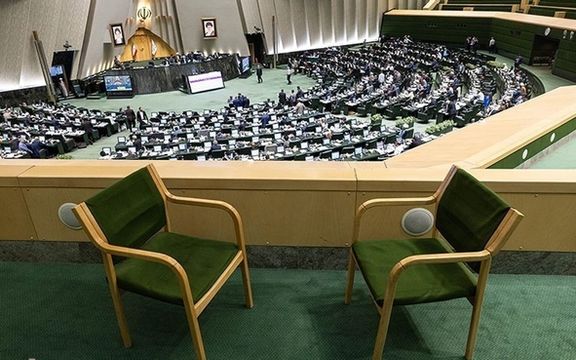
Iran’s parliament speaker, an old IRGC hand, fears isolation as ultraconservatives have begun forming coalitions to maximize their chances in the 2024 elections.
According to Iranian media, Mohammad Bagher Ghalibaf and his "neo-con" allies face a preponderance of hardliners who want to win power.
Ghalibaf won the speakership of the Majles (parliament) in 2020, despite the fact that his allies constituted a minority among the ultraconservative groups that control the parliament. His winning cards were his close ties to the IRGC and his kinship with Supreme Leader Ali Khamenei.
Nonetheless, those he calls "radicals" and teases as "revolutionaries" could have prevented his ascension to the Speaker's chair. They let him go forward only after he gave them concessions such as posts in and out of the parliament using his influence.
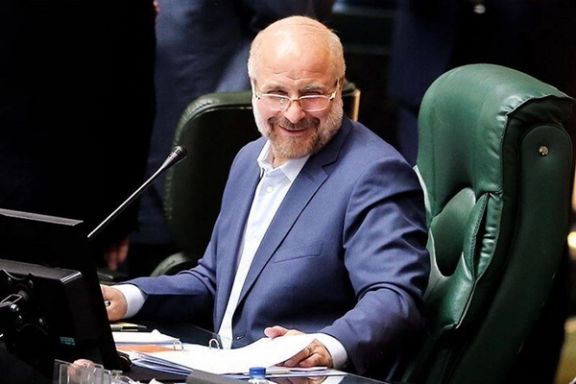
For the next year's elections, however, some young ultraconservatives such as populist Roads and Housing Minister Mehrdad Bazrpash and radical cleric Hamid Rasaei seem to have started early campaigning that marginalizes "old” conservatives such as Ghalibaf.
According to Rouydad24 news website in Tehran, young ultraconservatives have formed the Strategic Council of the Supporters of the Islamic Revolution (Persian acronym Sharian) led by Bazrpash. A group of conservatives also formed an alliance called the "Society To Revive the Popular Institutions of the Islamic Revolution" led by Tehran Mayor Alireza Zakani. The latter's opening session was attended by heavyweight hardliners such as Gholamali Haddad Adel, a former Majles speaker whose daughter is married to Khamenei's son Mojtaba.
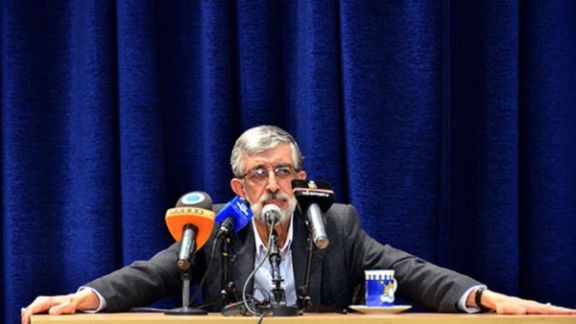
This group operates under the umbrella alliance called the council of Coalition of Revolutionary Forces (Persian acronym Shana).
Although both groups do not shy away from claiming that they want to monopolize political power, Sharian is better positioned as it rallied some 500 aspiring younger politicians in its general assembly, a far larger number than Shana.
Members of the older group say they are looking for unity among conservatives, an idea that failed to materialize during the past 30 years.
Young ultraconservatives, on the other hand, come from the same party that disrupted any attempt to unite conservatives during several parliamentary and presidential elections in Iran. Their party, Paydari, once close to former President Mahmoud Ahmadinejad, believes in networking at the bottom and bargaining for power at the top and that is what they have been successfully doing since 2005 when their name was Abadgaran Javan (Young developers).
Meanwhile, a report in Khabar Online featured photos and a long list of the leading members of the Sharian group mainly to show that they are much younger. The website tagged the next parliamentary election in Iran as a competition between young and old conservatives.
So far, the only reaction by Ghalibaf's neo-cons has been highlighting Bazrpash and Rasaei's bad records as well as the unpleasant track record of mayor Zakani in reports in the pro-Ghalibaf daily Sobh-e No and Farda News website which is also close to Ghalibaf. The daily characterized Rasaii as a critic of former IRGC Qods Force Commander Qasem Soleimani hoping it would alienate conservatives.
Khabar Online quoted some unnamed moderate conservatives as saying that one year ahead of the elections Ghalibaf cannot think of anything better than the position he already has
Meanwhile, according to centrist daily Ham-Mihan, Paydari and Sharian aim to knock Ghalibaf out of the Majles in the same way they ousted Haddad Adel a decade ago. Their message to Ghalibaf is that Raisi will definitely serve a second term as Iran's President and there is no chance for Ghalibaf to become Iran's next president. Their second message is that Ghalibaf himself may not be able to become the speaker again. His choices are limited and his days on the Speaker's seat are numbered.
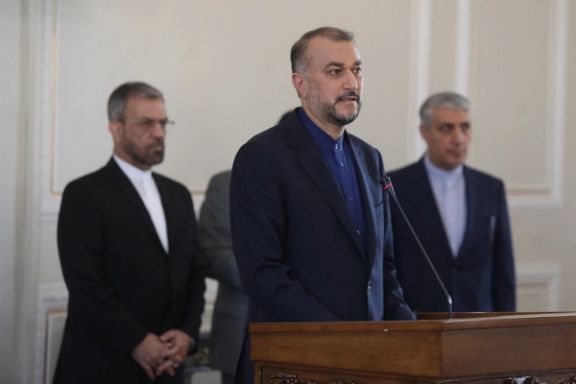
The foreign ministers of Iran and Belgium are in discussions regarding the fate of a Belgian aid worker sentenced to 40 years in prison and 74 lashes.
In late February and on the sidelines of the UN Human Rights Council in Geneva, Belgium’s Hadia Lahbib and Iran’s Hossein Amir-Abdollahian met to discuss the situation of Olivier Vandecasteele.
Vandecasteele, 41, was mysteriously lured back to the country last year by ‘a girlfriend’ and was subsequently detained. It is believed his arrest was an attempt to force Belgium to release Iranians in prison for terror offences.
His health is rapidly deteriorating since being in solitary confinement for a year under what is believed to be false allegations of espionage, typical of Iran’s hostage diplomacy. He has also been given a $1m fine.
Lahbib became a vocal supporter of the unrest after she cut her hair in a statement showing solidarity with the country’s ‘woman, life, freedom’ movement. She has, however, been blasted for her ongoing talks with the foreign minister as the two sides try to build bridges.
Daria Safaie, a member of the Belgian Parliament of Iranian origin, lashed out at the Belgian Foreign Minister on Wednesday that her meeting with Amir Abdollahian was “inappropriate”.
“You just kneel… and give them the message that they are more powerful and superior. They are happy with your kneeling and continue to take hostages.”
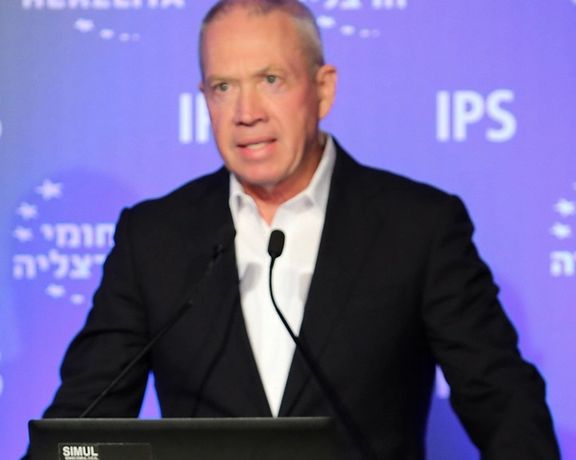
Israel's defense minister says the Islamic Republic must not be allowed to acquire nuclear weapons and Jerusalem must "be prepared for every course of action".
Yoav Gallant made the remarks on Thursday during a meeting with his American counterpart Lloyd Austin who landed in Israel’s Ben Gorion Airport earlier.
Israeli Prime Minister Benjamin Netanyahu told Iran International in an interview Wednesday that he will not tolerate if Iran becomes a nuclear threshold state. Successive Israeli governments have said they keep all options open to prevent Iran from obtaining nuclear weapons.
Austin's talks with Gallant focused in part on Iran, but escalating violence in the West Bank cast a long shadow over the negotiations.
A senior US defense official told Reuters on condition of anonymity that Israel's preoccupation with the West Bank "detracts from our ability to focus on what the strategic threat is right now and that is Iran's dangerous nuclear advances and continuing regional and global aggression."
Pentagon chief Austin, for his part, urged Israeli leaders to take steps to ease tensions in the occupied West Bank, amid growing concerns in Washington that the situation could distract allies from their efforts to counter Iran.
The United States is Israel's closest ally, and both countries are increasingly concerned about Iran's military activities in the region and its nuclear program, which Tehran says is entirely focused on power generation and other peaceful projects.

The family of an Iranian-Canadian woman who disappeared in Iran a year and a half ago, believe she has been imprisoned, one more of the unknown number of dual nationals held hostage by the Islamic Regime.
There is no official record of Behnoush Bahraminia's arrest or indictment, but her family claim two Iranian sources informed them that the regime has locked her up for "super threats to national security."
Typical of the charges alleged against dual-national hostages imprisoned without trial as Iran tries to negotiate for prisoner swaps around the world, Behnoush was traveling to Iran with her partner when she was forcefully disappeared.
Her father Amir Bahraminia told Global News that his daughter who lived in Metro Vancouver since 2013, was not a political person.
“She is in trouble. I know she is in Iran. I haven’t heard her voice and I haven’t seen her,” he said.
Bahraminia had previously traveled to Iran to visit family with no issues but on the last trip to Iran with her partner, Majid (Matthew) Safari, her family lost contact with her after landing in Tehran on November 6, 2021.
Safari, also an Iranian-Canadian, has also not been heard of by the family since Bahraminia's arrest. It is believed he planned to buy an apartment on the contested Kish Island in the south of Iran, for which the UAE is still battling for sovereignty.
The office of Canada's Foreign Affairs Minister, Melanie Joly, told Global Affairs Canada they are aware of the case and are gathering further information to provide consular assistance. Unlike other high profile cases, the Islamic Republic has yet made no public announcement on the situation.